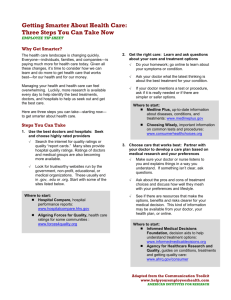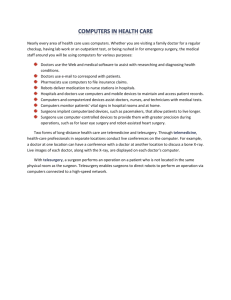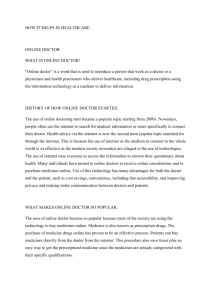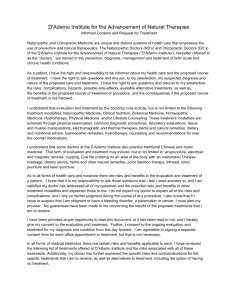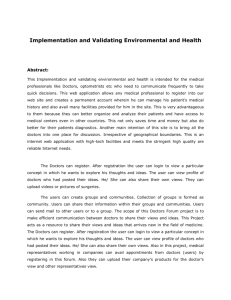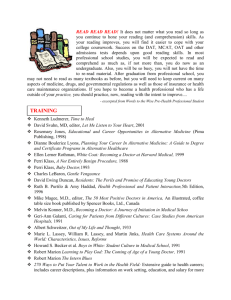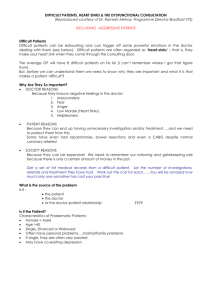Talking About the Cost of Care With Your Doctor
advertisement
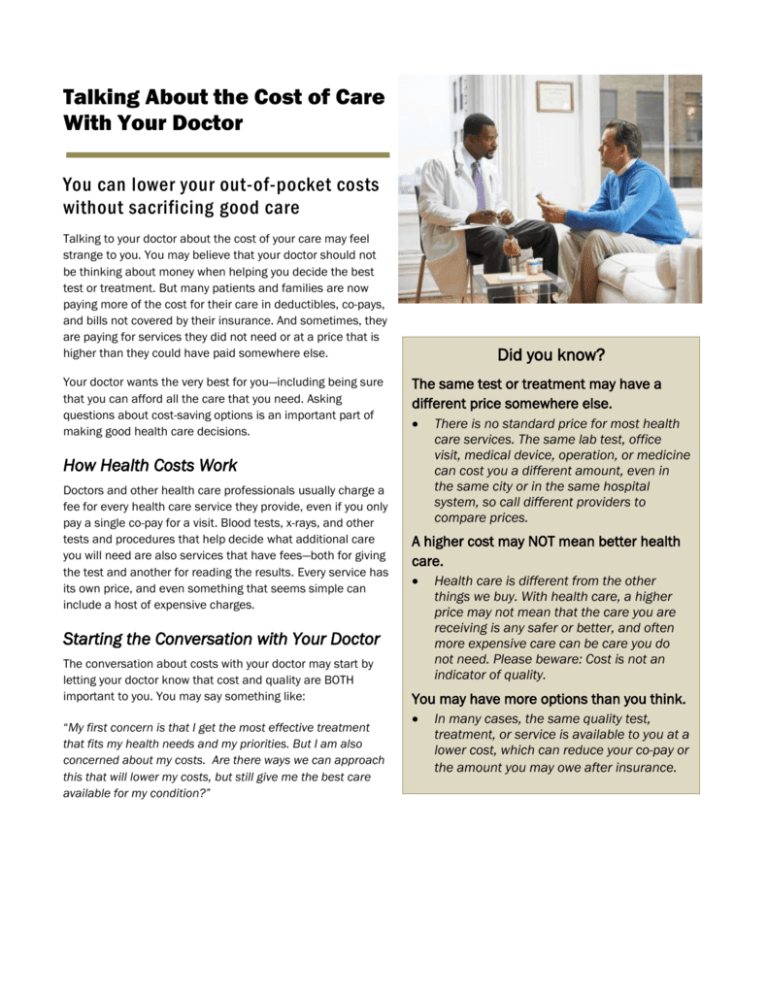
Talking About the Cost of Care With Your Doctor You can lower your out-of-pocket costs without sacrificing good care Talking to your doctor about the cost of your care may feel strange to you. You may believe that your doctor should not be thinking about money when helping you decide the best test or treatment. But many patients and families are now paying more of the cost for their care in deductibles, co-pays, and bills not covered by their insurance. And sometimes, they are paying for services they did not need or at a price that is higher than they could have paid somewhere else. Your doctor wants the very best for you—including being sure that you can afford all the care that you need. Asking questions about cost-saving options is an important part of making good health care decisions. Did you know? The same test or treatment may have a different price somewhere else. How Health Costs Work Doctors and other health care professionals usually charge a fee for every health care service they provide, even if you only pay a single co-pay for a visit. Blood tests, x-rays, and other tests and procedures that help decide what additional care you will need are also services that have fees—both for giving the test and another for reading the results. Every service has its own price, and even something that seems simple can include a host of expensive charges. A higher cost may NOT mean better health care. Starting the Conversation with Your Doctor The conversation about costs with your doctor may start by letting your doctor know that cost and quality are BOTH important to you. You may say something like: “My first concern is that I get the most effective treatment that fits my health needs and my priorities. But I am also concerned about my costs. Are there ways we can approach this that will lower my costs, but still give me the best care available for my condition?” There is no standard price for most health care services. The same lab test, office visit, medical device, operation, or medicine can cost you a different amount, even in the same city or in the same hospital system, so call different providers to compare prices. Health care is different from the other things we buy. With health care, a higher price may not mean that the care you are receiving is any safer or better, and often more expensive care can be care you do not need. Please beware: Cost is not an indicator of quality. You may have more options than you think. In many cases, the same quality test, treatment, or service is available to you at a lower cost, which can reduce your co-pay or the amount you may owe after insurance. Three Important Questions to Ask Every Time You Get Care Is this test or treatment something I really need? Sometimes patients get tests or even treatments they may not need. Health care services may be ordered out of habit rather than necessity. Ask your care provider to identify each service and explain its importance to your overall care and its potential impact on future tests and treatments. You may find some treatments and tests that are costing you money, including care the medical community used to believe were essential, can be eliminated without any impact on your overall health. Will talking about cost offend my doctor? Although doctors have not traditionally had conversations about costs with patients, these conversations are perfectly appropriate and becoming more common. Most doctors are willing to discuss costs and can help you think through cost as another factor when deciding the best test or treatment for your health. What’s the cost to me for that service? The cost of a given service to you depends on a variety of factors, including whether or not you have insurance, your insurer, your specific plan, and whether or not you have met your deductible. Physicians often do not know what the out-of-pocket cost to you is, but staff in the office’s billing department can usually help you find the specific costs to you. Additionally, many insurance companies, including [links to large insurers in area/employers’ insurance options] offer tools to help you identify what you will be required to pay out of pocket. Additionally, there are local and national resources included below that can help you identify which providers typically have lower costs. Is the same service available at a lower price? Prices for tests and treatments can vary even within a single city. For example, the very same MRI can cost $1,200 in one facility and $2,400 in a different facility. Yet, typically MRIs are of equally good quality. It is perfectly appropriate to ask about the cost of a treatment or test before receiving it and to see if the same quality service is available at a lower cost. Prescription medications are another opportunity for inquiring about prices and alternative options that can provide you with huge cost savings. Get Informed You can find information on the average cost of health care services from national resources, such as the Healthcare Blue Book (www.healthcarebluebook.com), FAIR Health (www.FAIRHealthConsumer.org), Pricing Healthcare (www.pricinghealthcare.com), and Clear Health Costs (www.clearhealthcosts.com). If you need surgery, check out state or local reports that compare hospital quality, such as [link to public reporting website]. About the Author American Institutes for Research (AIR) provides technical assistance for the Robert Wood Johnson Foundation’s Aligning Forces for Quality initiative. AIR is working with Aligning Forces communities to support consumer engagement efforts to promote high-quality health care at a low cost. With good information in hand, you’ll be better prepared to work with your health care professionals to make the choice that’s right for you. LOGO and pub information
